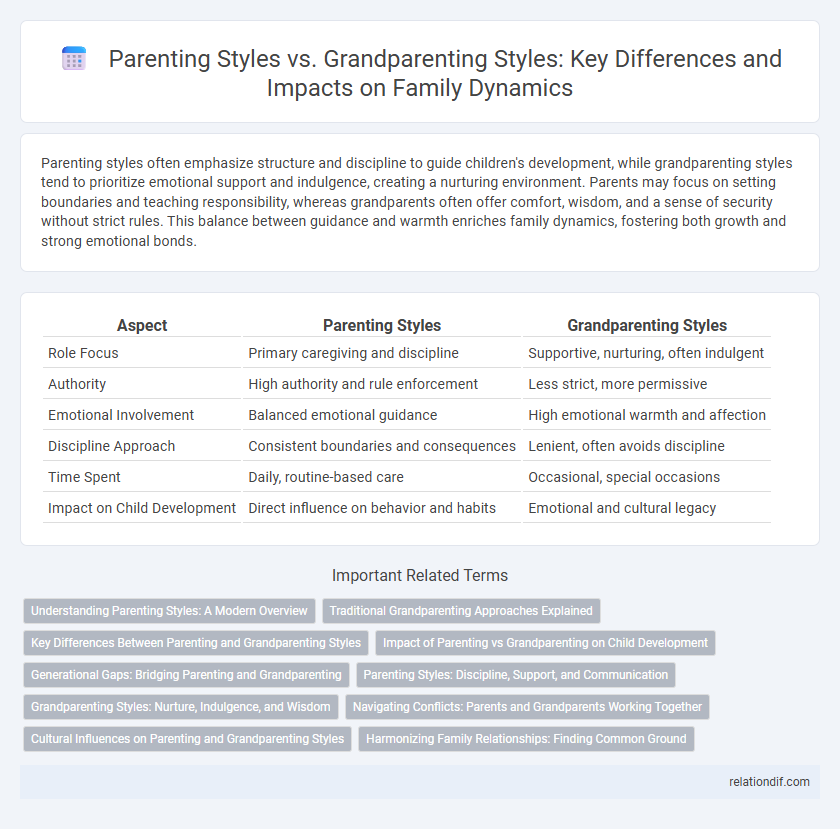Parenting styles often emphasize structure and discipline to guide children's development, while grandparenting styles tend to prioritize emotional support and indulgence, creating a nurturing environment. Parents may focus on setting boundaries and teaching responsibility, whereas grandparents often offer comfort, wisdom, and a sense of security without strict rules. This balance between guidance and warmth enriches family dynamics, fostering both growth and strong emotional bonds.
Table of Comparison
| Aspect | Parenting Styles | Grandparenting Styles |
|---|---|---|
| Role Focus | Primary caregiving and discipline | Supportive, nurturing, often indulgent |
| Authority | High authority and rule enforcement | Less strict, more permissive |
| Emotional Involvement | Balanced emotional guidance | High emotional warmth and affection |
| Discipline Approach | Consistent boundaries and consequences | Lenient, often avoids discipline |
| Time Spent | Daily, routine-based care | Occasional, special occasions |
| Impact on Child Development | Direct influence on behavior and habits | Emotional and cultural legacy |
Understanding Parenting Styles: A Modern Overview
Parenting styles, categorized as authoritative, authoritarian, permissive, and uninvolved, shape children's emotional and social development by balancing discipline and warmth. Grandparenting styles often blend traditional values with contemporary approaches, creating a unique dynamic that influences family cohesion and intergenerational bonding. Understanding these styles highlights the evolving roles within families and their impact on child well-being and identity formation.
Traditional Grandparenting Approaches Explained
Traditional grandparenting approaches emphasize nurturing, storytelling, and imparting family heritage, often balancing affection with gentle guidance. These styles typically reflect cultural values and generational wisdom, reinforcing family bonds across generations. Grandparents may adopt a more indulgent and less disciplinarian role compared to parenting styles, fostering a supportive environment for grandchildren.
Key Differences Between Parenting and Grandparenting Styles
Parenting styles emphasize consistent discipline, long-term behavioral development, and setting boundaries, while grandparenting styles generally focus on emotional support, indulgence, and nurturing without enforcing strict rules. Parents often engage in daily caregiving and decision-making responsibilities, contrasting with grandparents who typically provide occasional guidance and affectionate involvement. These key differences highlight how the roles of authority and support vary within family dynamics.
Impact of Parenting vs Grandparenting on Child Development
Parenting styles, such as authoritative, authoritarian, and permissive, directly shape a child's emotional regulation, social skills, and academic performance through consistent discipline and nurturing. Grandparenting styles, often more indulgent and less structured, provide emotional support and cultural continuity, positively influencing a child's sense of security and family identity. The combined impact of parenting and grandparenting creates a balanced development environment, enhancing resilience and cognitive growth in children.
Generational Gaps: Bridging Parenting and Grandparenting
Parenting styles often emphasize structured discipline and modern educational techniques, while grandparenting styles tend to reflect traditional values and emotional nurturing, creating a generational gap in family dynamics. Understanding the psychological theories behind authoritative, permissive, and uninvolved parenting alongside grandparents' more indulgent or advisory roles promotes collaboration in child-rearing. Exploring communication strategies and respect for differing perspectives enables effective bridging of parenting and grandparenting approaches, fostering a harmonious family environment.
Parenting Styles: Discipline, Support, and Communication
Parenting styles typically emphasize consistent discipline, emotional support, and open communication to foster children's development and well-being. Authoritative parents balance firm boundaries with nurturing interactions, encouraging independence while maintaining guidance. Clear communication channels and empathetic support contribute to effective behavior management and healthy parent-child relationships.
Grandparenting Styles: Nurture, Indulgence, and Wisdom
Grandparenting styles significantly influence family dynamics through nurture, indulgence, and wisdom. Nurturing grandparents provide emotional support and stability, fostering a sense of security in grandchildren. Indulgent grandparents often offer leniency and gifts, strengthening bonds through affection, while wise grandparents share life experiences and guidance, enriching the child's development and family heritage.
Navigating Conflicts: Parents and Grandparents Working Together
Parents and grandparents often adopt distinct parenting styles influenced by generational values and experiences, which can lead to conflicts in child-rearing approaches. Effective communication and mutual respect between parents and grandparents are essential for establishing consistent boundaries and shared expectations. Collaborative problem-solving strengthens family bonds, ensuring a supportive environment for the child's development.
Cultural Influences on Parenting and Grandparenting Styles
Parenting and grandparenting styles are deeply shaped by cultural norms, values, and traditions that dictate roles, discipline methods, and communication patterns within families. For example, collectivist cultures often emphasize obedience and respect for elders in both parenting and grandparenting, while individualistic cultures may prioritize independence and open dialogue. These cultural influences create distinct approaches to caregiving that affect intergenerational relationships and child development outcomes.
Harmonizing Family Relationships: Finding Common Ground
Parenting styles often emphasize structure and discipline, while grandparenting styles tend to focus on nurturing and indulgence, creating a dynamic balance within family interactions. Understanding and harmonizing these approaches can foster mutual respect and cohesive relationships among family members. Effective communication and shared family values serve as essential tools for finding common ground and enhancing intergenerational bonds.
Parenting styles vs Grandparenting styles Infographic

 relationdif.com
relationdif.com